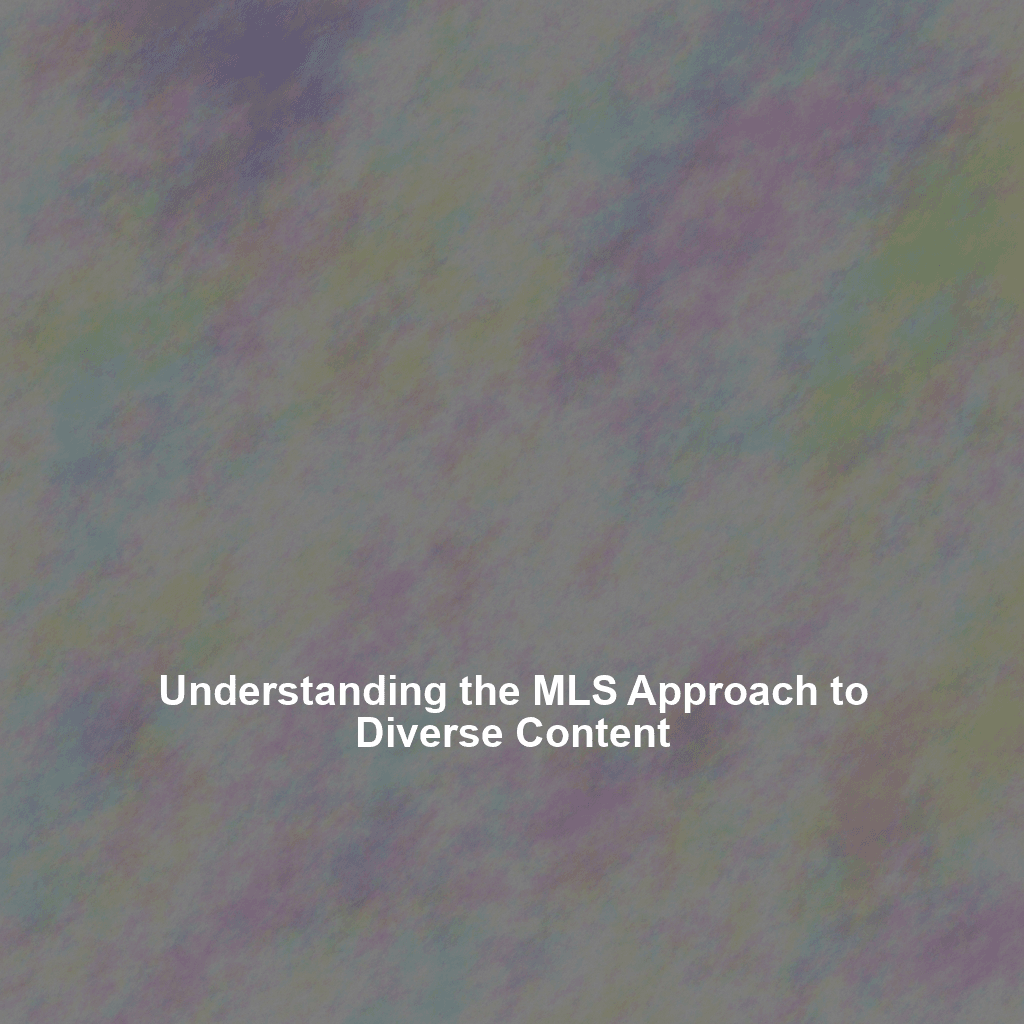Understanding the MLS Approach to Diverse Content
MLS faces a unique challenge. It operates in a country where soccer, though growing rapidly, still competes with established giants like American football, basketball, and baseball. Furthermore, its fanbase is incredibly diverse, representing a multitude of cultures, languages, and levels of soccer knowledge. To overcome these hurdles, MLS has strategically invested in content that speaks directly to these varied segments.
Language Localization and Cultural Nuance
MLS doesn’t simply translate content; it localizes it. This means adapting the language, tone, and imagery to resonate with specific cultural contexts. Consider the following examples:
- Spanish-Language Content: Beyond providing Spanish commentary and news on its website and app, MLS actively partners with Spanish-language media outlets like Univision and ESPN Deportes. These partnerships ensure that Spanish-speaking fans receive tailored content through familiar channels, increasing accessibility and trust. They even use different dialects depending on the area being targeted (e.g., Miami targeting Latin American Spanish speakers).
- Targeting Specific Communities: Teams often create content specifically for local immigrant communities. For example, if a team has a large Argentine population in its city, they might create content highlighting Argentine players, traditions, or celebrating national holidays. This hyper-local approach fosters a sense of belonging and strengthens the connection between the team and its community.
- Avoiding Cultural Missteps: MLS actively works to avoid cultural faux pas that could alienate fans. This involves careful research, sensitivity training for staff, and consulting with community leaders. The league understands that even well-intentioned content can backfire if it’s not culturally appropriate. For example, using music or imagery in a way that’s disrespectful to a particular culture.
Actionable Insight: Before launching any international or diversity-focused campaign, conduct thorough research on the target culture. Engage with cultural consultants to ensure your content is respectful, accurate, and resonant. Don’t just translate – transcreate. Transcreation goes beyond simply translating words; it adapts the message to convey the same meaning and emotional impact in a different cultural context. Learn from localization strategies employed by other global sports leagues like the NBA NBA Global and the English Premier League Premier League.
Catering to Different Levels of Soccer Fandom
Not all MLS fans are die-hard soccer aficionados. Many are casual viewers or newcomers to the sport. MLS addresses this by creating content for different levels of fandom:
- “Soccer 101” Content: MLS regularly produces content explaining the basics of the game, its rules, and its terminology. This is particularly important for attracting new fans who may be unfamiliar with soccer. They use easily digestible formats like short explainer videos and infographics.
- Behind-the-Scenes Access: MLS offers fans a glimpse behind the curtain with content showcasing player interviews, training sessions, and team culture. This “insider” content appeals to dedicated fans and provides a more personal connection to the team and its players. Think of docuseries similar to Netflix’s “Drive to Survive” for Formula 1, but tailored to MLS.
- Data-Driven Analysis: For the more analytically inclined fans, MLS provides in-depth statistical analysis, tactical breakdowns, and performance metrics. This caters to fans who enjoy a deeper understanding of the game and appreciate data-driven insights. MLSsoccer.com provides a lot of this type of content.
Actionable Insight: Segment your audience based on their level of knowledge and engagement. Create content that caters to each segment, from beginner-friendly explanations to advanced tactical analysis. Use quizzes and surveys to gauge your audience’s knowledge and tailor your content accordingly. Consider creating a tiered content strategy, offering basic content for beginners and more advanced content for experienced fans. This also helps nurture leads from awareness to consideration and eventually, advocacy.
Specific Content Strategies to Emulate from MLS
Leveraging Influencers and Ambassadors
MLS has effectively leveraged the power of influencers and brand ambassadors to reach new audiences and enhance its credibility. These influencers range from former players and celebrities to social media personalities and community leaders.
- Strategic Partnerships: MLS partners with influencers who align with its values and target audience. These partnerships can involve sponsored content, appearances at events, and social media campaigns.
- Authenticity is Key: The most effective influencer campaigns are those that feel authentic and genuine. MLS chooses influencers who are passionate about soccer and genuinely believe in the league.
- Reaching Niche Audiences: Influencers can help MLS reach niche audiences that it might not otherwise be able to connect with. For example, partnering with a popular gaming streamer to promote the eMLS league.
Actionable Insight: Identify influencers in your industry who align with your brand values and target audience. Develop mutually beneficial partnerships that provide value to both parties. Focus on authenticity and engagement rather than simply chasing vanity metrics like follower count. Consider micro-influencers, who often have more engaged audiences and can be more cost-effective.
Harnessing the Power of User-Generated Content (UGC)
MLS actively encourages fans to create and share their own content, fostering a sense of community and generating authentic engagement. This reduces the burden on MLS to create all the content and builds a stronger sense of ownership among fans.
- Contests and Challenges: MLS regularly hosts contests and challenges that encourage fans to submit their own content, such as videos, photos, and stories.
- Social Media Integration: MLS actively monitors social media for relevant fan-generated content and shares it on its official channels.
- Highlighting Fan Stories: MLS features fan stories on its website and social media channels, showcasing the passion and dedication of its fanbase.
Actionable Insight: Create opportunities for your audience to contribute content, such as contests, challenges, and social media campaigns. Actively monitor social media for relevant user-generated content and share it on your official channels. Feature compelling customer stories to build trust and credibility. Use a branded hashtag to encourage users to share their experiences and make it easier to track UGC. Tools like Hootsuite and Sprout Social can help with social listening.
Creating Engaging Video Content
Video is a powerful medium for engaging diverse audiences, and MLS has invested heavily in creating high-quality video content that resonates with fans worldwide.
- Short-Form Video: MLS utilizes short-form video platforms like TikTok and Instagram Reels to create engaging content that captures the attention of younger audiences. They create highlight reels, funny moments, and behind-the-scenes glimpses.
- Long-Form Documentaries: MLS produces longer-form documentaries that tell compelling stories about the league, its players, and its fans.
- Live Streaming: MLS streams live matches and events on its website and social media channels, providing fans with real-time access to the action.
Actionable Insight: Experiment with different video formats to see what resonates best with your audience. Invest in high-quality video production to create engaging and professional-looking content. Optimize your videos for different platforms and devices. Use captions and subtitles to make your videos accessible to a wider audience. A/B test different thumbnails and titles to maximize click-through rates. Consider hiring a professional video editor or animator to enhance the quality of your videos.
Tailoring Content for Specific Demographic Segments
Beyond language and level of fandom, it’s crucial to tailor content to specific demographic segments. MLS does this effectively by understanding the nuances of each group.
Millennials and Gen Z
These demographics are digital natives who consume content primarily on mobile devices and social media. MLS targets them with:
- Interactive Content: Quizzes, polls, and interactive games that encourage engagement.
- Mobile-First Design: Ensuring that all content is optimized for mobile viewing.
- Authentic Storytelling: Focusing on relatable player stories and authentic behind-the-scenes content.
Actionable Insight: Embrace mobile-first design principles and create content that is easily consumed on mobile devices. Use interactive formats to encourage engagement. Focus on authentic storytelling and relatable content that resonates with younger audiences. Experiment with new platforms like Twitch and Discord to reach these demographics where they already are.
Families
MLS recognizes the importance of attracting families to its games and creating a family-friendly atmosphere. Content for families includes:
- Kid-Friendly Content: Creating content specifically for children, such as cartoons, educational videos, and interactive games.
- Family-Focused Promotions: Offering family-friendly promotions and discounts on tickets and merchandise.
- Highlighting Family-Friendly Experiences: Showcasing the family-friendly atmosphere at MLS games and events.
Actionable Insight: Create content that is appropriate and engaging for children. Offer family-friendly promotions and discounts. Highlight the family-friendly aspects of your products or services. Partner with family-oriented organizations to reach a wider audience.
International Fans
For international fans, MLS focuses on showcasing the global appeal of the league and highlighting international players. This includes:
- Language Localization: Providing content in multiple languages.
- Highlighting International Players: Featuring international players in marketing campaigns and content.
- Showcasing the Global Game: Emphasizing the global nature of soccer and the international appeal of MLS.
Actionable Insight: Translate your content into multiple languages. Highlight international aspects of your product or service. Partner with international organizations or influencers. Adapt your marketing campaigns to resonate with different cultural contexts. Consider using a Content Delivery Network (CDN) to ensure fast loading times for users around the world.
Measuring and Analyzing Your Content Performance
Creating diverse content is only half the battle. You also need to track your results and make adjustments as needed. Key metrics to monitor include:
- Engagement Rates: Track likes, shares, comments, and click-through rates to measure how engaged your audience is with your content.
- Website Traffic: Monitor website traffic from different geographic regions and demographic groups to see which content is driving the most traffic.
- Conversion Rates: Track conversion rates for different segments of your audience to see which content is most effective at driving sales or leads.
- Social Media Reach: Monitor the reach and impressions of your social media posts to see how many people are seeing your content.
Actionable Insight: Use analytics tools like Google Analytics and social media analytics platforms to track your content performance. Segment your data to see how different demographic groups are responding to your content. A/B test different content formats and messaging to see what works best. Regularly review your data and make adjustments to your content strategy as needed. Consider using a marketing automation platform to track lead generation and nurture leads with tailored content.
Tools and Technologies:
- Google Analytics: For website traffic and user behavior analysis Google Analytics.
- Social Media Analytics: Platforms like Facebook Insights, Twitter Analytics, and LinkedIn Analytics provide data on audience engagement.
- HubSpot: A comprehensive marketing automation platform for tracking leads and conversion rates HubSpot.
- SEMrush: For SEO analysis and keyword research SEMrush.
Conclusion: Building a Global Brand Through Inclusive Content
Major League Soccer’s success in engaging a diverse global fanbase provides valuable lessons for any organization looking to expand its reach and improve its engagement with international markets or diverse domestic demographics. By prioritizing language localization, cultural sensitivity, audience segmentation, and high-quality video content, you can create content that resonates with a wider audience and builds a stronger, more inclusive brand. Remember to consistently measure and analyze your results to refine your strategy and ensure you are maximizing your impact. The key is to view diversity not as a challenge, but as an opportunity to create richer, more engaging content that connects with people on a deeper level.
 Skip to content
Skip to content

